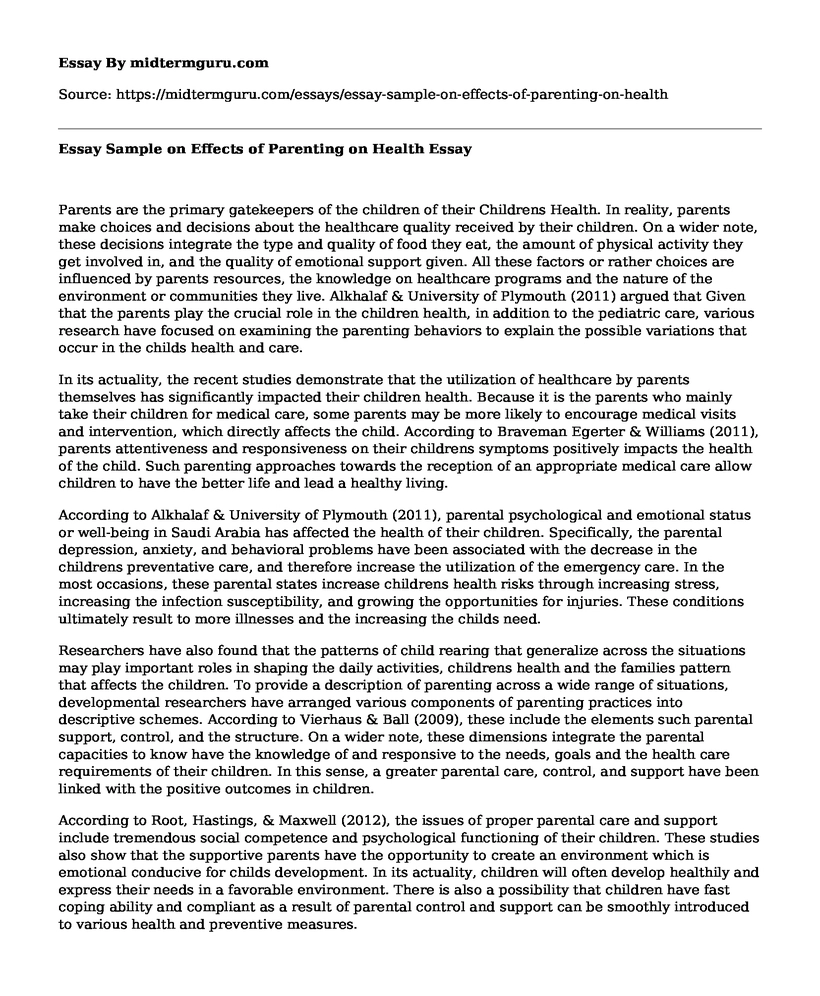Parents are the primary gatekeepers of the children of their Childrens Health. In reality, parents make choices and decisions about the healthcare quality received by their children. On a wider note, these decisions integrate the type and quality of food they eat, the amount of physical activity they get involved in, and the quality of emotional support given. All these factors or rather choices are influenced by parents resources, the knowledge on healthcare programs and the nature of the environment or communities they live. Alkhalaf & University of Plymouth (2011) argued that Given that the parents play the crucial role in the children health, in addition to the pediatric care, various research have focused on examining the parenting behaviors to explain the possible variations that occur in the childs health and care.
In its actuality, the recent studies demonstrate that the utilization of healthcare by parents themselves has significantly impacted their children health. Because it is the parents who mainly take their children for medical care, some parents may be more likely to encourage medical visits and intervention, which directly affects the child. According to Braveman Egerter & Williams (2011), parents attentiveness and responsiveness on their childrens symptoms positively impacts the health of the child. Such parenting approaches towards the reception of an appropriate medical care allow children to have the better life and lead a healthy living.
According to Alkhalaf & University of Plymouth (2011), parental psychological and emotional status or well-being in Saudi Arabia has affected the health of their children. Specifically, the parental depression, anxiety, and behavioral problems have been associated with the decrease in the childrens preventative care, and therefore increase the utilization of the emergency care. In the most occasions, these parental states increase childrens health risks through increasing stress, increasing the infection susceptibility, and growing the opportunities for injuries. These conditions ultimately result to more illnesses and the increasing the childs need.
Researchers have also found that the patterns of child rearing that generalize across the situations may play important roles in shaping the daily activities, childrens health and the families pattern that affects the children. To provide a description of parenting across a wide range of situations, developmental researchers have arranged various components of parenting practices into descriptive schemes. According to Vierhaus & Ball (2009), these include the elements such parental support, control, and the structure. On a wider note, these dimensions integrate the parental capacities to know have the knowledge of and responsive to the needs, goals and the health care requirements of their children. In this sense, a greater parental care, control, and support have been linked with the positive outcomes in children.
According to Root, Hastings, & Maxwell (2012), the issues of proper parental care and support include tremendous social competence and psychological functioning of their children. These studies also show that the supportive parents have the opportunity to create an environment which is emotional conducive for childs development. In its actuality, children will often develop healthily and express their needs in a favorable environment. There is also a possibility that children have fast coping ability and compliant as a result of parental control and support can be smoothly introduced to various health and preventive measures.
Finally, the empirical evidence as seen in the study by Braveman Egerter & Williams (2011), suggests that parenting dimensions such as behavioral control can predict childrens health status. Parents who guide their childrens behavior towards the acceptable standards hugely impacts on their children. Particular areas of development which are related to the health status and wellbeing may improve.
References
Alkhalaf, A. M. J., & University of Plymouth. Harsh parenting and encouragement from parents during childhood: Long-term effects on well-being, mental health, and major illness. (2011) University of Plymouth.
Braveman, P., Egerter, S., & Williams, D. R. The social determinants of health: Coming of age. Annual Review of Public Health, 32, 38198. doi:10.1146/annurev-publhealth-(2011). 031210 101218
Lohaus, A., Vierhaus, M., & Ball, J. Parenting styles and health-related behavior in childhood and early adolescence: Results of a longitudinal study. Journal of Early Adolescence, 29, (2009) 449475. doi:10.1177/0272431608322954
Root, A. E., Hastings, P. D., & Maxwell, K. L. Environmental contributions to the development of social competence: Focus on parents. In V. Anderson, & M. Beauchamp (Eds.), Developmental Social Neuroscience and Childhood Brain Insult: Implications for Theory and Practice. 2012 (pp. 91115). New York: Guilford Press
Cite this page
Essay Sample on Effects of Parenting on Health. (2021, Jul 02). Retrieved from https://midtermguru.com/essays/essay-sample-on-effects-of-parenting-on-health
If you are the original author of this essay and no longer wish to have it published on the midtermguru.com website, please click below to request its removal:
- Essay on the Impact of Supreme Court Decision on the Affordable Care Act
- Improving Nurses Practice to Reduce the Number of Falls in Male Rehabilitation
- Research Paper on Supporting Young Mothers
- Japanese Maternity Culture - Essay Sample
- Essay Sample on Connections Among Nursing Analysis, Management, and Outcomes
- My Ambition: To Become a Highly Qualified Nurse and Help Those in Need - Essay Sample
- Patients at Risk: Inadequate Data Storage in Hospitals - Essay Sample







